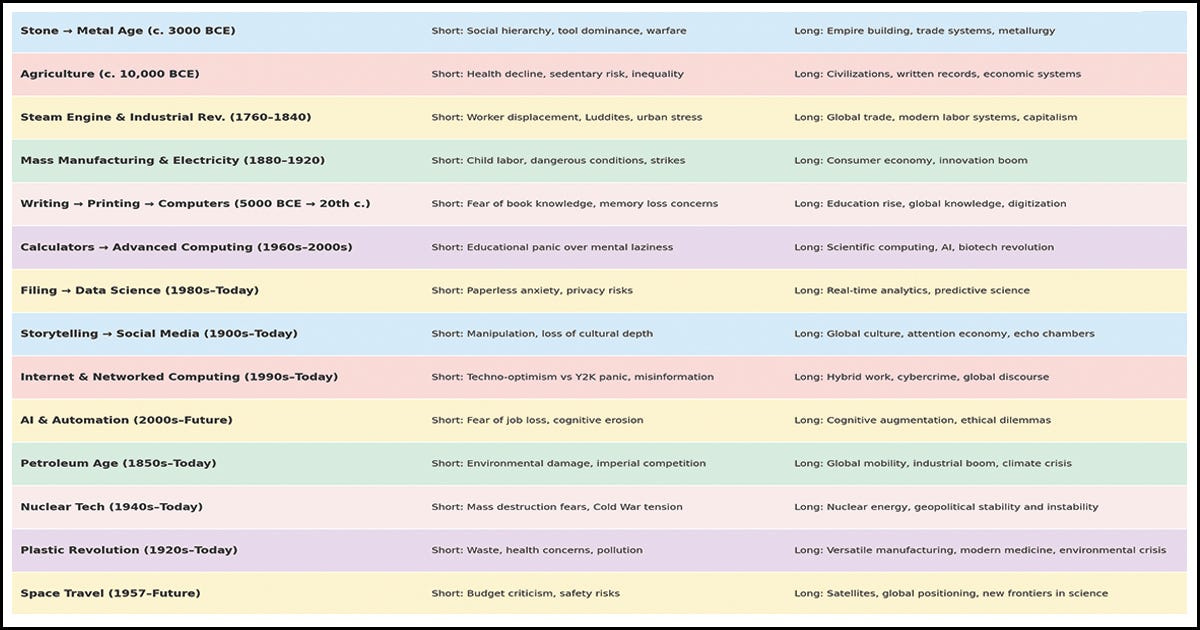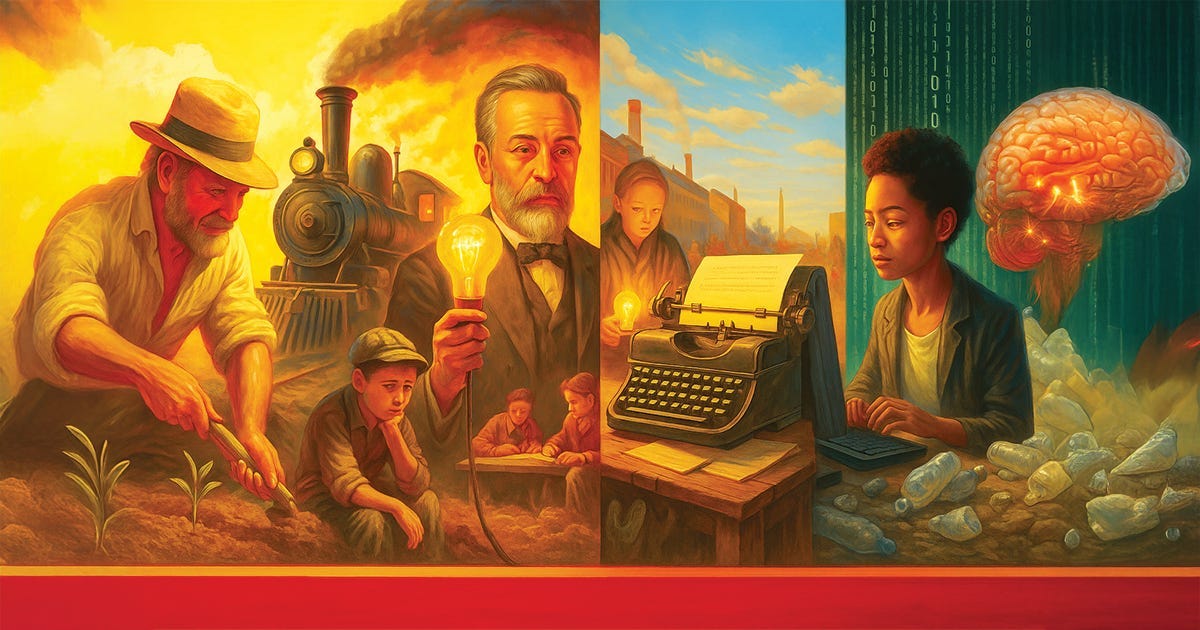From Stone Tools to Quantum Computing: Every Leap Forward Came With an Unexpected Price
You’ve seen the progress — now see the cost. The hidden patterns behind 10,000 years of human innovation.

The Moment the Alarm Bells Went Off
A chill ran through academic and educational circles this past month — and rightfully so.
A recent MIT Media Lab study dropped a bombshell that no parent, teacher, policymaker, or technologist can afford to ignore: ChatGPT may be silently eroding the human brain’s ability to think, remember, and create.
In what may become one of the most pivotal educational studies of the decade, researchers recorded live brain activity via EEG across 32 neural regions as 54 participants attempted SAT-style writing exercises. The results? Startlingly clear, deeply concerning — and perhaps just the beginning of a cognitive shift that could define a generation.
“83.3% of ChatGPT users couldn’t recall what they had written minutes earlier.”
That single statistic has ignited debates worldwide. Not just because it’s shocking — but because it’s plausible. We’ve all felt it: the ease, the seduction of the shortcut. But this time, the shortcut doesn’t just save time — it might be deleting your thinking in real time.
Essential Highlights From the MIT Study
ChatGPT Users (Group 1):
Lowest cognitive engagement across all dimensions: brain waves, language, behavior.
EEG revealed suppressed activity in executive control and memory regions (alpha, theta).
Essays were described as “soulless, repetitive, and unoriginal” by teachers.
Most participants fully outsourced the task by their third attempt — copy-pasting with minimal input.
In follow-up memory tasks, they struggled to recall their own writing.
Google Search + Brain-Only Groups (Groups 2 & 3):
Higher brain connectivity, especially in creativity and memory centers.
Greater originality, curiosity, and satisfaction with their work.
The Google group performed nearly as well as the brain-only group, proving that active research still supports cognitive development.
Why It’s So Alarming
Young brains are most at risk: The developing mind may permanently lose its capacity for deep thinking if exposed too early to cognitive outsourcing.
Lead researcher Nataliya Kosmyna published the study early to warn against reckless AI-in-education policies, such as “GPT Kindergarten.”
Psychiatric experts warn of weakening memory, attention, and resilience in students who rely heavily on AI.
“We’re accidentally raising a generation that can produce without understanding.”
“Before AI took your job, electricity made you work one. This is the full story of how disruption shaped your world.”
Technology has always promised more — more speed, more power, more control. But from the first bronze blade to the latest line of code, every upgrade has cost us something: our health, our rituals, our attention, our memory.
In 2025, we stand at another threshold. And the stakes have never been higher.
History of Innovation: A Repeating Story
Across every era, humanity’s greatest inventions came with paradoxical effects — advancing civilization while upending social structures, displacing labor, and rewriting what it means to be human.
Let’s walk through the timeline of these breakthroughs — what we gained, what we lost, and why AI might be the most consequential of them all.
1. Stone Tools → Metal Age
Short-term fear: Unequal power, warfare.
Long-term shift: Civilizations and empires rose on metallurgy’s back.
The invention of metal tools was more than a convenience — it was a weapon. Those who forged it ruled.
2. Agricultural Revolution (~10,000 BCE)
Short-term fear: Poorer diets, infectious disease, and overpopulation.
Long-term shift: Cities, religion, taxes, hierarchy.
Farming didn’t just feed us — it defined how we would live and die.
3. Steam Engines & Industrial Revolution (1760–1840)
Short-term fear: Luddite riots, factory exploitation.
Long-term shift: Capitalism, labor unions, fossil dependence.
4. Mass Manufacturing & Electricity (1880–1920)
Short-term fear: Factory fires, child labor.
Long-term shift: Consumer economies, electrified everything.
5. Writing → Printing Press → Computers (5000 BCE → 20th century)
Short-term fear: Memory decay, loss of oral culture.
Long-term shift: Literacy, education, and scientific advancement.
6. Calculators → Advanced Computing (1960s–2000s)
Short-term fear: “Mental laziness.”
Long-term shift: AI, biotech, simulation-based science.
7. Filing Cabinets → Data Science (1980s–Today)
Short-term fear: Privacy erosion.
Long-term shift: Predictive modeling, digital governance.
8. Oral Storytelling → Film → Advertising → Social Media (1900s–Today)
Short-term fear: Cultural manipulation.
Long-term shift: Attention economy, psychological engineering.
9. Internet & Networked Computing (1990s–Today)
Short-term fear: Digital addiction, Y2K.
Long-term shift: Cyberculture, surveillance capitalism.
10. AI & Automation (2000s–Future)
Short-term fear: Job loss, cognitive erosion
Long-term shift: Cognitive augmentation, ethical dilemmas
“Short-term fear. Long-term revolution. The tech timeline every parent, leader, and student needs to see.”
11. Nuclear Technology (1940s–present)
Short-term fear: Global fear of annihilation post-Hiroshima and Nagasaki, nuclear arms race, Cold War tension
Long-term shift: Nuclear deterrence has reshaped geopolitics, power generation, and civilian energy infrastructure in many nations, as well as radioactive waste — a miracle or a menace? Toxic legacy, radioactive waste, Chernobyl, Fukushima.
Tradeoff: Ultimate energy density — with existential risk.
12. Petroleum & Fossil Fuels (1850s–Today)
Short-term fear: Oil wars, fueled oil dependence — triggering colonialism, Middle East conflicts, pollution, explosive growth in automobiles, aviation, and plastics, urban smog, oil spills, and global economic vulnerability.
Long-term shift: Petrochemical addiction — spanning fertilizers, fuels, plastics, and pharmaceuticals — has fueled global warming, mass extinction pressure, and an escalating climate crisis, while tethering economies to volatile oil markets and recurring energy shocks.
Tradeoff: Unmatched mobility — at the cost of Earth’s stability.
13. Plastics & Synthetic Materials (1920s–Today)
Short-term impact: Revolutionized packaging, manufacturing, and medicine, low cost, high utility — immediate economic boon, became essential in war (e.g., WWII materials), waste, and toxicity
Long-term shift: Microplastics have infiltrated oceans, bodies, and food chains, creating a planetary-scale waste crisis. Recycling efforts are lagging behind as society shifts from a culture of durability to one of disposability.
Tradeoff: Convenience and scale — versus environmental permanence.
14. Space Travel & Satellite Era (1957–Future)
Short-term fear: Cold War space race: Sputnik, Apollo, national pride, space race militarization, public fascination with the cosmos, massive government spending, and tech spillover.
Long-term shift: Space technologies have enabled global communication, GPS, weather tracking, and Earth observation — while also contributing to orbital debris, space militarization, private commercialization, and a renewed push toward colonization and planetary escape.
Tradeoff: Global connectivity — with militarized skies and orbital debris.
Observation
Technological evolution has never been neutral. Every leap forward had a cost — of labor, of attention, of autonomy.
AI will be no different. But for the first time, the cost is cognitive.
We’re not just automating work — we’re risking automating thinking.
“The question isn’t whether AI belongs in the classroom. It’s whether it will elevate or erode the human mind.”
And that answer is still up to us.
“Short-term fear. Long-term revolution. The tech timeline every parent, leader, and student needs to see.”

Enter AI: Disruption on a Cognitive Level
MIT Media Lab’s study has delivered an unnerving signal: ChatGPT users showed the lowest brain activity, poorest memory retention, and least original thinking of any group tested.
Students who used only their brains wrote better, remembered more, and engaged deeper.
Those who used ChatGPT? Copy-pasted soulless essays, couldn’t recall their content, and showed declining effort over time.
“83.3% of ChatGPT users couldn’t quote from essays they wrote minutes earlier.”
In contrast, just 11% of students who wrote manually failed to recall their work.
AI, in this context, doesn’t just assist — it replaces active thought with passive consumption.
The Waze Analogy: Convenience vs Competence
“Using AI for writing is like using Waze for driving — convenient, but it breeds dependency.” — Dave Blundin
Like GPS, AI doesn’t make you smarter — it makes you faster if you already know where you’re going. But without the foundational thinking? You’re lost the moment the app goes offline.
Education’s Fork in the Road
We can ban AI (like calculators once were), or we can teach with it. But first, we need to teach without it.
Students must master core concepts and reasoning before utilizing AI to enhance their learning.
Teachers must evaluate process and comprehension, not just output.
AI should be used for amplification — not substitution.
“This isn’t just history — it’s your future. Find your place in the next big disruption.”
AI Is Our iPhone Moment — Or Our Next Opioid
Like smartphones, AI could empower a generation — or addict it.
The same algorithms that generate brilliance can also erode resilience. We must ask:
Do we want intellectual giants who collaborate with AI, or intellectual dependents who can’t function without it?
This is the last moment we can still choose.
Risk of Misuse: History Repeats, Only Faster
Coca-Cola didn’t conquer the world because it was healthy — it ran 8 ads for every 1 you noticed. Now imagine that advertising, but intelligent, personalized, and trained on your child’s brain.
Tools aren’t evil. But their scale and speed are now superhuman.
So too, must be our ethics.
Religion, Belief & Social Systems Evolve Too
Every disruption brought new stories — gods, kings, money, ideologies.
Now, AI becomes the next belief system: authoritative, inscrutable, divine to some.
Will we question it, or worship it?
Will AI be the new priesthood, or a tool of democratized intellect?
Final Thought
Technological evolution has never been neutral.
Every leap forward had a cost — of labor, of attention, of autonomy.
AI will be no different.
But now, for the first time, the cost is cognitive.
We’re not just automating work — we’re risking automating thinking.
“The question isn’t whether AI belongs in the classroom.
It’s whether it will elevate or erode the human mind.”
And that answer is still up to us.
💬 Did this resonate? Drop a comment below.
👏 Clap up to 50 times to support this message reaching more people.
🔁 Share it with someone who may benefit from it.
Glossary of Terms:
EEG (Electroencephalogram): A method to record brain activity using electrical sensors placed on the scalp.
Cognitive Engagement: The degree of mental effort, attention, and processing used during a task.
Generative AI: Artificial intelligence that can create content (text, images, etc.) like ChatGPT.
Alpha/Theta Bands: Brainwave frequencies associated with relaxation (alpha) and memory/creativity (theta).
Surveillance Capitalism: An Economic model based on extracting and monetizing personal data.
Petrochemical Addiction: Dependence on petroleum-derived materials, including plastics and fertilizers.
Orbital Debris: Space junk left by satellites and spacecraft poses collision risks in orbit.
Cognitive Outsourcing: Relying on technology (like AI) to do thinking or decision-making instead of the human brain.
Sources and References:
Kosmyna, N. (2024). Preprint Study on AI and Cognitive Load. MIT Media Lab.
Freinkel, S. (2011). Plastic: A Toxic Love Story. Houghton Mifflin Harcourt.
Yergin, D. (1990). The Prize: The Epic Quest for Oil, Money & Power. Simon & Schuster.
Hecht, G. (2012). Being Nuclear: Africans and the Global Uranium Trade. MIT Press.
McDougall, W.A. (1985). …The Heavens and the Earth: A Political History of the Space Age. Basic Books.
Harvard University (2024). AI and Motivation Study. Internal Memo, Department of Psychology.
Blundin, D. (2024). AI Dependency and the Waze Analogy. Keynote, Fountain Life Metatrends.
Photo Credit: The author created the images using Freepik AI.
#AICognitiveErosion #TimelineOfTechnologyDisruptions #ChatGPTbrainStudy #HistoryOfInnovationTradeoffs





